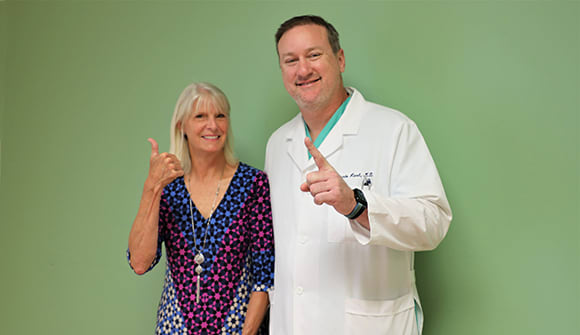Cranial karma
Woman joins aneurysm study to help others, saves her own life.
Article Date:

Pamela Jordan, 61, exercises three days a week and lives a healthy lifestyle. Though she wasn't having any symptoms, her sister had been diagnosed and treated for a brain aneurysm by Ricardo Hanel, MD, PhD, neurosurgeon and co-medical director of Baptist Stroke & Cerebrovascular Center, in 2021. Additionally, her brother had suffered a stroke in the past. So, when her sister asked her to participate in a research study at Baptist Health, funded by the State of Florida, to assess whether aneurysms run in families, she agreed.
"I wasn't thinking I'd have a problem, but if I could do something to help others, I'm all for it," Jordan said. "I was surprised when they actually found something!"
Family ties
A brain aneurysm is a weak spot on a blood vessel in the brain that bulges and fills with blood, like a bubble. Unruptured brain aneurysms often have no symptoms. A ruptured one, however, may cause serious health conditions including stroke, brain damage, coma or death.
The Familial Brain Aneurysm Study is intended to help researchers determine the extent a family's history of brain aneurysms plays in the likelihood of occurrence in later generations. It also examines genetic markers of the serious condition. The findings may be used to advance the use of routine screening during medical exams.
"Today, we know that if you have two first-degree relatives – mother, father, siblings with a brain aneurysm, your risk of having one increases from 4% to 8%," said Dr. Hanel, who is the principal investigator of the study.
Participants receive a magnetic resonance angiographic (MRA) scan that provides images of arteries in the brain to evaluate them for abnormalities, such as aneurysms.
When Dr. Hanel reviewed Jordan's imaging, he found an unruptured aneurysm behind her right eye – the same location as her sister's. The size, placement and Jordan's age indicated an elevated risk for rupture.
Controlled outcome
To prevent a potentially life-threatening situation, Dr. Hanel inserted a cylindrical "pipeline" device to slow the flow of blood into the aneurysm and allow the vessel to heal.
Jordan was grateful it was found before it burst. "Rather than having an emergency with a ruptured aneurysm or stroke, I had a controlled situation with proper treatment," she said.
Jordan was the first family member to be treated for an aneurysm found during the study. She has since encouraged her brother and three adult children to participate.
"Discovering Mrs. Jordan's aneurysm in the course of the study is gratifying because we helped prevent a possible emergency, and it's further evidence that heredity may play a role in the likelihood of aneurysm in a family line," said Dr. Hanel.
Baptist Health first announced the study in September 2021 upon receiving a $250,000 grant from the State of Florida. In April 2022, the state granted an additional $500,000.
Baptist Health is recruiting new participants for the Familial Brain Aneurysm Study. To qualify, a patient diagnosed with an intracranial aneurysm and at least one first-degree family member (mother, father, sibling, child) must participate. There is no cost. For more information, email LyerlyResearch@bmcjax.com.



